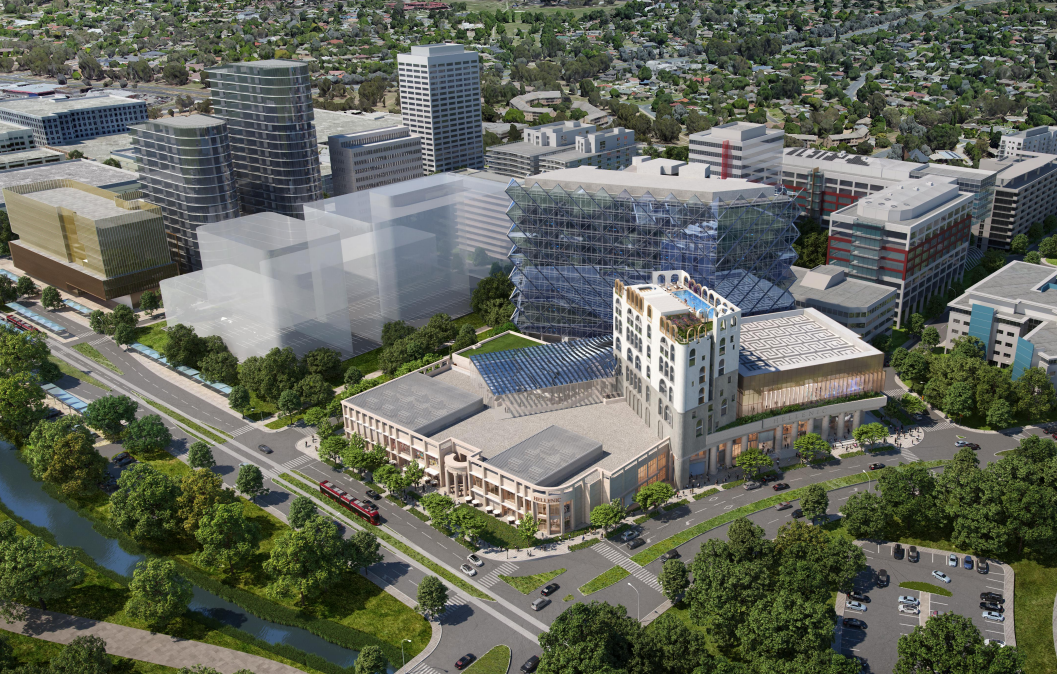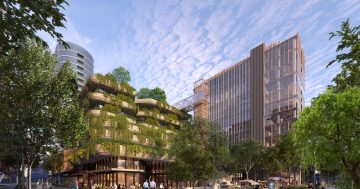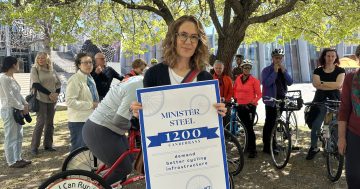
An artist’s impression of the proposed Hellenic Club Precinct in Woden. Photo: Fender Katsalidis.
The Hellenic Club’s plan to move a bikeway as part of its redevelopment plans in Woden has been labelled “audacious and self-serving” by the ACT’s cycling lobby.
Pedal Power ACT has condemned the club’s plans to relocate the bikeway to the southern side of Matilda Street so it can build a taxi bay.
Executive director Simon Copland said the bikeway would not be immediately rebuilt, with the Hellenic Club claiming it would happen at the future cost of the developer of Block 7 opposite.
While generally supportive of the redevelopment project, Pedal Power believes moving the bikeway would cut off a key link for cyclists, with no realistic plans for it to be redeveloped.
“The Hellenic Club’s proposal to move the bikeway is audacious and self-serving,” he said.
“To suit their own convenience and take advantage of the widened verge constructed for the bikeway, the Hellenic Club wishes to inconvenience riders and pass on the cost to another, yet unidentified, developer at some, unspecified, time.”

An aerial view of the Hellenic Club site showing Matilda Street. Photo: Purdon Planning.
Mr Copland said the ACT Government built the existing dedicated bikeway in 2017 at a cost of $1 million.
“It involved widening the verge at the expense of road width and landscaping the full length of Matilda Street,” he said.
“Moving the bikeway would mean it would no longer line up with the spur path and bridge across Yarralumla Creek and the proposed protected crossing of Callam Street being built as part of the Woden Interchange.”
Mr Copland said Matilda Street was a Main Community Route and the primary east-west active travel route from the east to the northern part of the Woden Town Centre.
He said it would become more important when the Callam Street interchange was completed and light rail arrived.
“It is also important to note that bike riders will tend to ignore a route on the south side of Matilda Street as it means diverting away from the most direct route,” Mr Copland said.
“Rather, they will tend to cycle straight on, putting them in danger and making the relocated bikeway redundant.”
He said the problem was of the Hellenic Club’s own making and should not be rewarded by moving the bikeway at somebody else’s cost.
“Under this proposal, it is not even clear if and when the bikeway would be redeveloped, nor who would pay for it,” Mr Copland said.
“There is a high risk that even if the developer of Block 7 agreed to take on this task, the timing would not occur simultaneously, thus leaving the community with no bikeway for at least a while.”

An internal view of the proposed development. Photo: Fender Katsalidis.
The site plan shows a taxi rank on the northern side of Matilda Street where the bikeway is currently located.
But the Hellenic Club said it had proposed relocating the bikeway as it would be safer and have better urban design, planning and connectivity outcomes.
Club CEO Ian Cameron said that if the bikeway stayed where it was, cyclists would have to negotiate vehicles entering and leaving the precinct’s car parks and trucks using the current loading dock.
He said the proposed relocation would strengthen the importance of the cycle path along Matilda Street and, at the same time, improve the safety of those using it by removing the interactions between cyclists and vehicles that would occur should the cycle lane remain where it is.
“Government restrictions mean that we can only provide vehicle access to the new Hellenic Precinct from Matilda Street or Bowes Street. That is because Callam Street is mooted to be a light rail and pedestrian corridor, and Launceston Street is a major vehicle arterial route,” he said.
Mr Cameron said the plan was to retain the current loading dock in its present position and it would be a potential point of conflict between trucks and cyclists.
Also proposed were a new basement loading dock, a porte-cochère accessible from Bowes Street, and a three-lane ramp for the basement car park, accessible from Matilda Street.
“By distributing these access points on different streets, vehicle movements are less concentrated and it reduces the number of turning interactions, resulting in a safer street network,” Mr Cameron said.
Mr Cameron said relocating the bikeway would also place the cycle path on the sunny side of Matilda Street as part of a new public park, improving the cycling experience compared with its current shaded location.
Connections to the east and west into the broader cycle network would be accommodated as part of the road network updates, he said.
“There is a genuine desire to encourage green travel by means of walking, cycling and light rail,” Mr Cameron said.
He said the redevelopment proposed 138 public bike parking spaces, distributed both in dedicated secure areas and within the precinct, as well as 252 spaces for employees.
“Whilst it is not integral to the scheme that the current cycle lane is relocated to the south, it will ensure that all visitors and employees, whether arriving by foot, bicycle, light rail or car are able to visit in a safe and enjoyable manner,” Mr Cameron said.





















